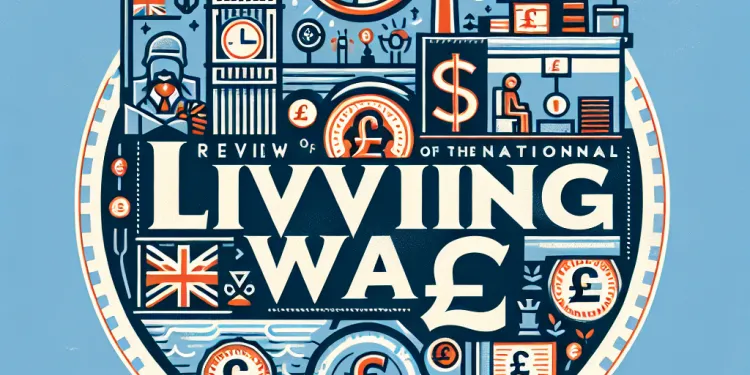
Find A Professional
More Items From Ergsy search
-

Is the Living Wage Foundation's rate the same as the National Living Wage?
Relevance: 100%
-

How often do wage rates change in the UK?
Relevance: 100%
-

How can I calculate my new earnings based on the National Living Wage increase?
Relevance: 74%
-

How do economic conditions influence interest rate changes?
Relevance: 74%
-

Are apprentices entitled to the National Living Wage?
Relevance: 74%
-

How does the National Living Wage differ from the National Minimum Wage?
Relevance: 73%
-

How does interest rate affect my car finance agreement?
Relevance: 73%
-

How does the UK National Living Wage compare internationally?
Relevance: 68%
-

What happens to my monthly payments if interest rates rise?
Relevance: 67%
-

Major Banks Announce Changes in Interest Rates: Are You Affected?
Relevance: 65%
-

Are first-time buyers affected differently by interest rate changes?
Relevance: 65%
-

What is a tracker mortgage and how does it respond to interest rate changes?
Relevance: 64%
-

Why do interest rates rise and fall?
Relevance: 63%
-

What is the new UK National Living Wage for 2026?
Relevance: 61%
-

How is the National Living Wage calculated?
Relevance: 60%
-

UK national living wage increase 2026
Relevance: 60%
-

Are employers legally required to pay the National Living Wage?
Relevance: 60%
-

Can my lender change my interest rate without notification?
Relevance: 58%
-

Why is the National Living Wage being increased?
Relevance: 58%
-

How do interest rate changes affect my mortgage payments?
Relevance: 58%
-

Who is eligible for the National Living Wage?
Relevance: 58%
-

How often is the National Living Wage reviewed?
Relevance: 53%
-

Where can I find official announcements on the National Living Wage?
Relevance: 51%
-

How can I protect myself from rising interest rates?
Relevance: 50%
-

What is the mortality rate of Marburg virus disease?
Relevance: 47%
-

What is the survival rate for bowel cancer?
Relevance: 46%
-

What is the mortality rate of Nipah Virus infection?
Relevance: 46%
-

What is an SVR and how does it relate to interest rate changes?
Relevance: 46%
-

Are zero-hour contract workers entitled to the National Living Wage?
Relevance: 45%
-

Will the increase in the National Living Wage affect inflation?
Relevance: 43%
-

Suicide and Self Harm Prevention Strategy 2023-28
Relevance: 42%
-

What happens if an employer pays below the National Living Wage?
Relevance: 38%
-

Could there be a reduction in the basic rate of income tax by 2026?
Relevance: 37%
-

Is there a change in National Insurance rates for 2026?
Relevance: 35%
-

Will there be a change in the additional rate threshold in April 2026?
Relevance: 32%
-

Is it possible to switch my mortgage type if interest rates become unfavourable?
Relevance: 31%
-

Does the National Living Wage increase mean my taxes will change?
Relevance: 30%
-

What is the mortality rate of untreated bubonic plague?
Relevance: 30%
-

Will my fixed-rate mortgage payments change with interest rate fluctuations?
Relevance: 29%
-

Is IVF successful?
Relevance: 29%
Understanding Wage Rate Changes in the UK
In the UK, wage rate changes are influenced by a variety of factors including economic conditions, inflation, government policies, and labor market dynamics. Understanding how often and why these changes occur is crucial for both employees and employers. This overview will provide insights into the typical frequency and reasons behind wage rate adjustments in the UK.
Annual Wage Reviews
One significant factor in wage rate changes in the UK is annual wage reviews. Many organizations conduct performance and salary reviews annually, typically aligned with the end of the financial year or calendar year. During these reviews, employers assess the performance of their staff and may decide to adjust wages based on individual achievements, inflation rates, or company profitability.
Inflation and Cost of Living Adjustments
Inflation plays a crucial role in wage rate changes as it affects the cost of living. When inflation rates increase, the purchasing power of employees decreases. As a result, workers often seek wage rises to maintain their standard of living. Employers may implement cost of living adjustments (COLA) to keep wages in line with inflation, typically assessed and potentially adjusted annually.
Minimum Wage Changes
The National Minimum Wage and National Living Wage in the UK are statutory wage rates that change annually. The Low Pay Commission recommends increases to the minimum wage based on economic conditions, and the UK government usually implements these changes in April each year. These adjustments ensure that the lowest-paid workers see regular increases in their wage rates.
Industry-Specific Trends
Different industries may experience wage rate changes at varying frequencies due to sector-specific factors. For instance, industries with rapid technological advancements or skill shortages may see more frequent wage adjustments to attract and retain talent. Conversely, industries facing economic downturns or low demand may experience stagnation in wage growth.
Collective Bargaining
In sectors where unions are strong, wage rate changes can occur as a result of collective bargaining. Trade unions negotiate on behalf of employees to secure better wages and working conditions, and these negotiations can lead to wage adjustments at varying intervals, dependent on the outcomes of these discussions and the agreed contract durations.
Economic Indicators and Market Conditions
The broader economic environment significantly influences wage rate changes. Economic growth, unemployment rates, and labor market conditions can all impact how often wages are adjusted. During periods of economic prosperity, companies are more likely to increase wages, whereas during recessions, wage freezes or low increases might be more common.
Conclusion
In summary, wage rates in the UK vary across different sectors and are influenced by diverse factors such as annual reviews, inflation, statutory requirements, and economic conditions. While there is no set frequency for when wage changes occur, understanding the contributing factors can help individuals and businesses anticipate and respond to wage rate adjustments effectively.
Understanding Wage Rate Changes in the UK
In the UK, how much people get paid can change for many reasons. These reasons include how the economy is doing, changes in prices (inflation), government rules, and the job market. Knowing when and why pay changes is important for people who work and for their bosses. This guide will help explain how often pay changes happen and why they occur.
Annual Wage Reviews
Every year, many companies look at how their workers are doing and how much they get paid. This often happens at the end of the year. During this time, bosses check each worker’s performance and might raise pay based on how well they did, how much prices have gone up, or if the company made a lot of money.
Inflation and Cost of Living Adjustments
Inflation is when the cost of things goes up. When this happens, the money workers earn can buy less. Workers might ask for more pay to keep living comfortably. Some bosses may raise pay to match inflation. This is called a Cost of Living Adjustment (COLA), and it usually happens once a year.
Minimum Wage Changes
The government sets a minimum amount that workers must be paid called the National Minimum Wage and National Living Wage. These rates change every year. The Low Pay Commission suggests new rates based on the economy, and the government makes these changes in April to help the lowest-paid workers get more money.
Industry-Specific Trends
Different jobs may see pay changes more or less often. For example, if a job needs special skills or there's a lot of new technology, wages might go up more often to bring in workers. But in jobs where there is less money or not much demand, pay might not change much.
Collective Bargaining
In jobs with strong unions, pay might change because of collective bargaining. This means the union talks with the bosses to get better pay and working conditions. How often this happens depends on what is agreed upon during these talks.
Economic Indicators and Market Conditions
Pay changes are also affected by the state of the economy. When the economy is doing well, companies might raise wages. But when things are tough, such as during a recession, companies might not change pay or might only give small increases.
Conclusion
In short, how much people get paid in the UK can change for many reasons, like yearly reviews, inflation, government rules, and the economy. There isn't a set rule for how often pay changes happen, but knowing the reasons can help workers and companies plan better.
Frequently Asked Questions
How often do national minimum wage rates change in the UK?
The national minimum wage rates in the UK typically change once a year.
When is the UK national minimum wage rate usually reviewed?
The UK national minimum wage rate is usually reviewed annually.
What time of year do new wage rates typically take effect in the UK?
New wage rates in the UK typically take effect in April each year.
Who is responsible for setting wage rates in the UK?
The UK government sets wage rates, often following recommendations from the Low Pay Commission.
Can wage rates change more than once a year in the UK?
Wage rates typically change once a year, but extenuating circumstances could prompt additional reviews.
Are there different rates for different age groups in UK wage standards?
Yes, the UK has different minimum wage rates depending on age groups and apprenticeships.
What factors influence changes in wage rates in the UK?
Factors include inflation, economic conditions, and recommendations from the Low Pay Commission.
Is the wage rate change consistent across all sectors in the UK?
Yes, national minimum wage changes apply to all sectors, but some industries may have their own pay agreements.
Does Brexit affect how often wage rates change in the UK?
Brexit has influenced economic conditions but has not directly changed the frequency of wage rate reviews.
Are there any exceptions to the annual wage rate changes in the UK?
Exceptions are rare, but substantial economic changes could prompt different considerations.
How is the public informed about changes in wage rates in the UK?
The UK government announces changes through official channels and public communications.
Do wage rate changes in the UK affect self-employed individuals?
No, national minimum wage rates do not typically apply to self-employed individuals.
Are wage rate reviews influenced by international economic trends?
Yes, international economic trends and trade conditions can impact wage rate considerations.
What role does the Low Pay Commission have in wage rate changes?
The Low Pay Commission advises the government on wage rate adjustments.
Have there been years when wage rates did not change in the UK?
It is rare, but wage rates generally change annually to accommodate economic conditions.
Is there public consultation on wage rate changes in the UK?
Yes, the Low Pay Commission often consults with businesses and workers before recommending changes.
How do changes in wage rates impact cost of living in the UK?
Wage rate increases aim to align with cost of living and inflation, helping workers maintain living standards.
Do all workers in the UK earn at least the national minimum wage?
Legally, all eligible workers must be paid at least the national minimum wage in the UK.
How can employees verify their correct wage rate in the UK?
Employees can consult their employment contract and use government resources to verify wage rates.
How does the government monitor compliance with wage rate laws?
The UK government conducts inspections and offers a helpline for reporting non-compliance with wage laws.
How often do the lowest pay rates in the UK change?
The lowest pay, called minimum wage, changes once a year in the UK.
Helpful Tip: Use a calendar or reminder app to remember when it changes.
Ask someone you trust to help check the new pay rates each year.
The smallest amount of money workers can be paid in the UK usually changes once a year.
How often does the UK look at how much the national minimum wage should be?
The UK checks the national minimum wage every year. This means they look to see if it needs to change or stay the same. They usually do this in April.
If you find reading hard, ask someone for help. Using a calendar or reminder app can help you remember important dates.
Every year, people in the UK look at how much money workers must be paid. This amount is called the minimum wage.
When do new pay rates usually start in the UK?
Let's break down this question:
Pay rates: This is how much money people get paid for their work.
Start: This means when something begins.
UK: This is the United Kingdom, which includes countries like England and Scotland.
To answer: New pay rates often start in April each year.
Helpful tip: You can use a calendar and mark April to remember when pay rates might change.
In the UK, new pay rates usually start in April every year.
Who decides how much money people get paid in the UK?
In the UK, different people and groups help decide how much money workers should earn.
The government sets the minimum wage. This is the least money you can get paid for work.
Employers and workers also talk and decide on wages. This happens at businesses or places where people work.
If you need help understanding wages, you can talk to a teacher or a family member. They can explain more.
The UK government decides how much money people should earn at work. They usually listen to advice from a group called the Low Pay Commission before making a decision.
Can pay change more than once a year in the UK?
Yes, what you earn can change many times in a year.
Your boss might give you a pay rise (more money) or pay cut (less money) at different times.
If you find reading hard, ask someone to help you understand.
Pay rates usually change one time every year. But if something important happens, we might look at it again.
Do people of different ages get different pay in the UK?
Yes, in the UK, the amount of money you get paid can change based on your age and if you are an apprentice.
What makes wages go up or down in the UK?
Wages are what you get paid for work. Sometimes they go up, and sometimes they go down. Here are some things that can change wages:
- Economy: If the economy is doing well, wages might go up. If it's not doing well, wages might stay the same or go down.
- Skills: If workers learn new skills, they might get paid more.
- Jobs: If there are lots of jobs, wages might go up. If there are not many jobs, wages might go down.
- Cost of living: If things get more expensive, wages might go up so people can afford things.
- Minimum wage: The government sets a lowest wage for workers. If this goes up, some wages go up too.
You can use tools like pictures or simple charts to better understand wage changes.
Things that decide this are:
- Prices going up (this is called inflation)
- How the money and jobs are doing (this is the economy)
- Ideas from a group called the Low Pay Commission
Here are some helpful things you can use:
- Reading apps that read the text out loud.
- Highlight important words to make them stand out.
Do all jobs in the UK have the same pay changes?
Yes, the minimum wage changes affect all jobs. But some jobs might have their own special pay rules.
Does Brexit change how often people’s pay goes up or down in the UK?
Brexit has changed the economy, but it has not changed how often wages are looked at.
Are there any rules about who doesn't follow the yearly wage changes in the UK?
Some jobs might not change pay when others do. This means they are special.
Using a calendar can help you remember when changes happen. It's also good to ask someone you trust if you don’t understand.
Exceptions don't happen often, but big changes in the economy might make us think differently.
How do people find out about changes in pay in the UK?
People can learn about pay changes in these ways:
- TV and radio news
- Online news websites
- Talking to friends and family
- Reading newspapers
- Checking government websites
These things might help:
- Ask someone to explain if you don't understand.
- Use simple news websites that use easy words.
- Watch videos that explain pay rates.
The UK government tells people about changes in rules or plans by using TV, radio, and other ways to talk to the public.
Do changes in pay rates in the UK affect people who work for themselves?
Here is a simpler version of the question:
When pay rates change in the UK, do they affect people who have their own business?
To help understand, you can:
- Use pictures or diagrams to explain.
- Talk to someone about it.
- Use simple examples or stories.
No, if you work for yourself, the national minimum wage usually doesn't apply to you.
Do changes in the world economy affect how we change wages?
Yes, changes in the world economy and trade can affect how much money people earn.
What does the Low Pay Commission do with wages?
The Low Pay Commission gives advice to the government on changing wages.
Did some years in the UK have no change in pay rates?
Wages are the money people get paid for work. Wages usually change once a year. This is to match how the economy is doing, like if prices for things go up.
Can people give their opinions about pay changes in the UK?
Yes, the Low Pay Commission talks to businesses and workers before making changes.
How do changes in pay affect living costs in the UK?
When pay goes up or down, it can change how much money people need every day in the UK. If pay goes up, people might have more money to spend. But if things cost more, money does not go as far.
If pay goes down, it can be harder for people to buy what they need. It’s important to think about how much things cost compared to how much people earn.
Tools like calculators can help figure out money. Making a budget can also help plan spending.
When wages go up, it helps workers pay for things they need. This is because prices for things like food and houses sometimes go up too.
Do all workers in the UK get paid the national minimum wage?
In the UK, most workers should get at least a minimum amount of money for their work. This is called the "national minimum wage."
Some workers, like very young people or certain types of apprentices, might earn less. It is important to check if you are getting the right pay.
Using tools like a wage calculator can help you know if you are being paid correctly. You can also ask someone you trust for help.
In the UK, all people who work must be paid at least the national minimum wage if they are allowed to get it.
How can workers check their pay in the UK?
Here is how you can check your pay:
- Look at your pay slip. This paper shows your pay and any money taken out.
- Ask your boss or HR department. They can help you understand your pay.
- Visit the government website on pay rates. It has lots of helpful information.
- Use a calculator tool online to check your pay is right.
Remember to get help if you have questions!
Workers can look at their job papers to check their pay. They can also use government websites to find out how much money they should get.
How does the government check if people follow wage laws?
The government makes sure workers get paid the right amount of money. They use different ways to check this.
Here are some ways they do it:
- They have people who look at company records to see if workers get the right pay.
- Workers can tell the government if they think something is wrong with their pay.
- The government can visit companies to check if they follow pay rules.
If a company is not following the rules, the government can tell them to fix it.
Tools to help understand:
- Ask someone you trust to explain what the rules mean.
- Use pictures or videos to help learn about wage laws.
The UK government checks to make sure companies pay the right wages. They have a phone line to call if you want to report someone not following the wage rules.
Useful Links
- Ergsy carfully checks the information in the videos we provide here.
- Videos shown by Youtube after a video has completed, have NOT been reviewed by ERGSY.
- To view, click the arrow in centre of video.
- Most of the videos you find here will have subtitles and/or closed captions available.
- You may need to turn these on, and choose your preferred language.
- Go to the video you'd like to watch.
- If closed captions (CC) are available, settings will be visible on the bottom right of the video player.
- To turn on Captions, click settings .
- To turn off Captions, click settings again.
More Items From Ergsy search
-

Is the Living Wage Foundation's rate the same as the National Living Wage?
Relevance: 100%
-

How often do wage rates change in the UK?
Relevance: 100%
-

How can I calculate my new earnings based on the National Living Wage increase?
Relevance: 74%
-

How do economic conditions influence interest rate changes?
Relevance: 74%
-

Are apprentices entitled to the National Living Wage?
Relevance: 74%
-

How does the National Living Wage differ from the National Minimum Wage?
Relevance: 73%
-

How does interest rate affect my car finance agreement?
Relevance: 73%
-

How does the UK National Living Wage compare internationally?
Relevance: 68%
-

What happens to my monthly payments if interest rates rise?
Relevance: 67%
-

Major Banks Announce Changes in Interest Rates: Are You Affected?
Relevance: 65%
-

Are first-time buyers affected differently by interest rate changes?
Relevance: 65%
-

What is a tracker mortgage and how does it respond to interest rate changes?
Relevance: 64%
-

Why do interest rates rise and fall?
Relevance: 63%
-

What is the new UK National Living Wage for 2026?
Relevance: 61%
-

How is the National Living Wage calculated?
Relevance: 60%
-

UK national living wage increase 2026
Relevance: 60%
-

Are employers legally required to pay the National Living Wage?
Relevance: 60%
-

Can my lender change my interest rate without notification?
Relevance: 58%
-

Why is the National Living Wage being increased?
Relevance: 58%
-

How do interest rate changes affect my mortgage payments?
Relevance: 58%
-

Who is eligible for the National Living Wage?
Relevance: 58%
-

How often is the National Living Wage reviewed?
Relevance: 53%
-

Where can I find official announcements on the National Living Wage?
Relevance: 51%
-

How can I protect myself from rising interest rates?
Relevance: 50%
-

What is the mortality rate of Marburg virus disease?
Relevance: 47%
-

What is the survival rate for bowel cancer?
Relevance: 46%
-

What is the mortality rate of Nipah Virus infection?
Relevance: 46%
-

What is an SVR and how does it relate to interest rate changes?
Relevance: 46%
-

Are zero-hour contract workers entitled to the National Living Wage?
Relevance: 45%
-

Will the increase in the National Living Wage affect inflation?
Relevance: 43%
-

Suicide and Self Harm Prevention Strategy 2023-28
Relevance: 42%
-

What happens if an employer pays below the National Living Wage?
Relevance: 38%
-

Could there be a reduction in the basic rate of income tax by 2026?
Relevance: 37%
-

Is there a change in National Insurance rates for 2026?
Relevance: 35%
-

Will there be a change in the additional rate threshold in April 2026?
Relevance: 32%
-

Is it possible to switch my mortgage type if interest rates become unfavourable?
Relevance: 31%
-

Does the National Living Wage increase mean my taxes will change?
Relevance: 30%
-

What is the mortality rate of untreated bubonic plague?
Relevance: 30%
-

Will my fixed-rate mortgage payments change with interest rate fluctuations?
Relevance: 29%
-

Is IVF successful?
Relevance: 29%